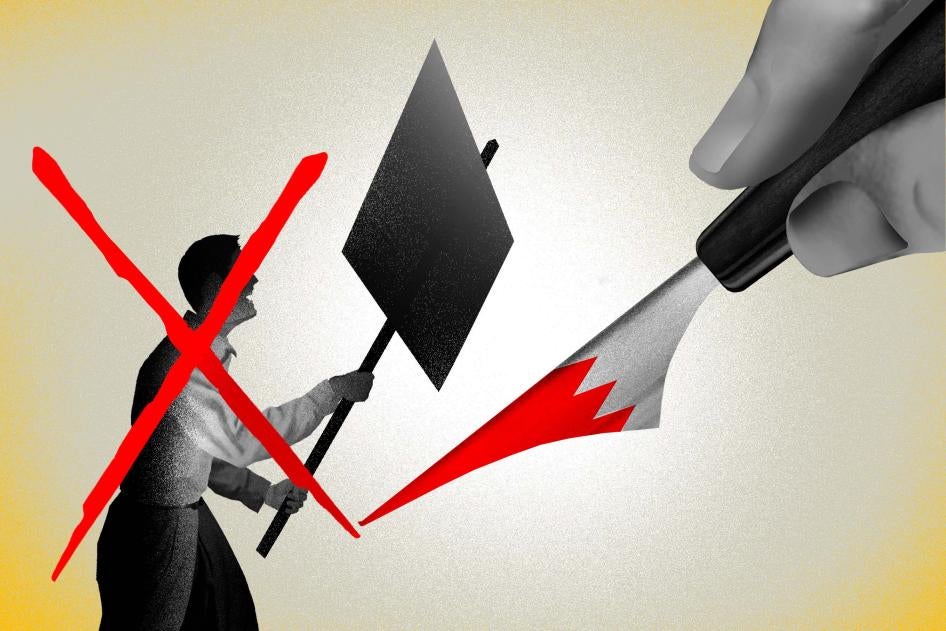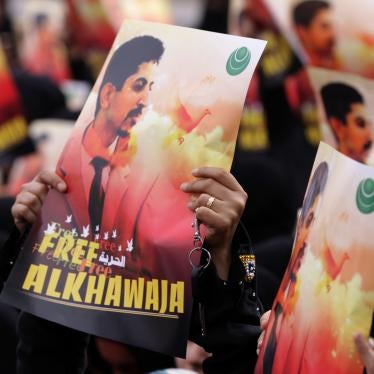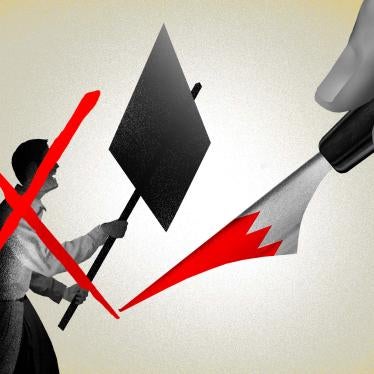(Beirut) –The Bahraini government is using its political isolation laws and a series of other tactics to keep activists and former opposition party members out of public office and other aspects of public life, Human Rights Watch said in a report released today.
The 38-page report, “You Can’t Call Bahrain A Democracy: Bahrain’s Political Isolation Laws,” documents the use of Bahrain’s 2018 political isolation laws to keep political opponents from running for parliament seats or even serving on the boards of governors of civic organizations. Human Rights Watch found that the government’s targeted marginalization of opposition figures from social, political, civil, and economic life in Bahrain resulted in a spectrum of other human rights abuses.
“Bahrain has spent the last decade cracking down on peaceful opposition and the political isolation laws are yet another example of the government’s repression expanding into new spheres,” said Joey Shea, Middle East and North Africa researcher at Human Rights Watch. “These draconian laws have made a mockery of Bahrain’s upcoming parliamentary ‘elections,’ which can neither be free nor fair when you make any political opposition essentially illegal.”
Human Rights Watch interviewed activists, civil society members, and opposition figures, and reviewed and analyzed government statements, laws, and court records.
Bahrain’s judiciary dissolved the country’s two major opposition parties, al-Wifaq and Wa’ad, in 2016 and 2017 respectively. The political isolation laws introduced new punitive consequences by punishing individual members of these groups in perpetuity. The law also targets activists and human rights defenders who were arrested in the government’s large-scale crackdown during and in the aftermath of the peaceful 2011 pro-democracy and anti-government uprising. The final clause of the political isolation laws, concerning individuals who have “disrupted” constitutional life in Bahrain, has been interpreted by Bahraini lawyers and civil society to target former lawmakers and others who resigned or boycotted their elected posts to protest repressive government policies.
During the November 2018 parliamentary elections, the first election during which the political isolation laws were in effect, at least 12 former opposition figures were prohibited from running by Bahrain’s Ministry of Justice. Many others believed they would be victims of the law and boycotted the elections.
In addition to cases of people barred from running for office, Human Rights Watch documented three cases of civil society organizations that struggled to form a board and carry on with their activities due to the impact of these laws. They are: the Bahrain Human Rights Society, the Bahrain Women’s Union, a group of 13 groups that advocate for women’s rights in Bahrain, and the Bahraini Society for Resisting Normalization, which opposes the normalization of relations with Israel.
The delays in allowing groups to form a board have had devastating consequences. If a new board is not elected and confirmed before the two-year term limit of the previous board expires, the Ministry of Labour and Social Development suspends access to the organization’s bank accounts and funding sources, forcing the association to stop work. Board vacancies also allow the Ministry of Labour and Social Development to appoint new members, leading to fears that the boards may eventually be stacked with government loyalists and “become pro-government more and more,” as one activist told Human Rights Watch.
A member of a civil society group said that “more than 80 percent of the members cannot be a candidate because they were either in Wa’ad, al-Wifaq, or another organization dissolved by the court.” Bahraini activists fear that the law will ultimately result in civil society organizations failing to achieve any progress on human rights because they cannot be seen as critical of the authorities.
The Bahraini government is also using a form of economic sanction against opposition figures by denying them “Good Conduct Certificates.” The certificate is issued at the discretion of the General Directorate of Crime Detection and Forensic Evidence within the Ministry of Interior and is required for Bahraini citizens and residents to get a job, apply for university admission, or even join a sports or social club. Former prisoners wait months or years for the certificate. Some opposition figures are denied the certificate outright, harming their ability to support themselves and their families.
One member of Bahrain’s civil society told Human Rights Watch, “a friend wanted me to be the head of the school, but the ministry refused the certificate so I could not work. The owner of the school was told by the ministry that they couldn’t accept me because I was a member of a political society.”
The report also documents the continued detentions and summons of Bahraini citizens for speech-related offenses. A former Bahraini journalist said that because of the “continuous arrests since 2011 until 2017, fear became part of what people experience on a daily basis. It became normal for people to censor themselves and silence themselves before they react.”
The Bahraini government should repeal the 2018 political isolation laws, end the practice of denying certificates of good behavior to punish perceived opponents, and restore full legal, political, and civil rights to all Bahraini citizens. It should restore the previously dissolved political societies, lift all restrictions imposed on opposition figures regarding candidacy in the parliamentary and municipal elections, end the restrictive measures that are harming the basic functioning of civil associations, and release anyone jailed solely for their peaceful political activities.
Other countries, including close allies of Bahrain like the US, United Kingdom, and European Union states, should pressure Bahraini authorities to end its repression of peaceful opposition and civil society, and reject the results of what will be unfree and unfair parliamentary elections in November if they do not.
“Bahrain’s once vibrant civil society and opposition coalition are being wiped out by laws codifying the government’s repression,” Shea said. “No one should be under any illusion that Bahrain’s ‘democratic institutions’ are anything more than a sham.”








